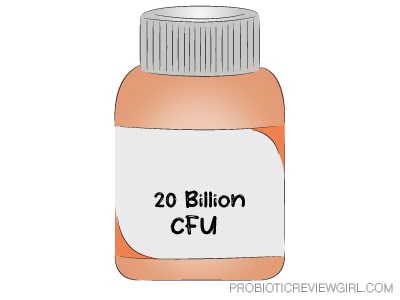What Are Colony Forming Units? (CFU VS AFU)
When I first started looking for a probiotic supplement to help with my IBS issues I naively thought that choosing the highest CFU count would be the best maker for quality.
Choosing a higher CFU instead initially made my IBS far worse with digestive side effects and I took probiotic strains I didn't need.
In this guide I will be covering what Colony Forming Unit's are and detailing why choosing a high CFU count isn't always what is what you should do.
What is a CFU Count?
The first you need to know is that CFU stands for colony forming units. The CFU are the concentration of probiotic microorganisms multiplied by the Final Dilution Factor to provide a CFU/ml result.
Placed on an agar plate under a microscope it's possible to count these individual colony's since they are alive and able to replicate. If you counted 45 colony forming units you would then multiply this by the FDF.
This is why it's hypothesized that a strong that a large CFU count results in a better probiotic supplement. Some people assume this means you are ingesting more living probiotic bacteria.
Probiotic capsule supplements typically range from 10 billion up to 100 billion Colony Forming Units. Probiotic gummy supplements containing one strain are typically lower at under 5 Billion CFU.
Higher CFU Count

Before taking a High CFU count (50+ Billion) you should be aware that you will be more likely to experience digestive side effects as your microbiome adjusts and you experience die off.
If you have places to be publicly make sure you take this account before taking a higher CFU count probiotic.
My advice wold be to pick something that packs enough power to get results but not high enough to make symptoms worse. If you are trying to fix something like
In my experience testing probiotics for this blog, I found the perfect CFU count to be 40-Billion CFU for my IBS and general gut health.
In this study on a reduction of GI symptoms participants were administered 25-Billion CFU of Lactobacillus Acidophilus.
If you have a condition that just won't fix, you may need to bite the bullet and got with a high CFU count but for most people a higher count won't work better than something in slightly lower.
Lower CFU Count

I would always suggest that those new to probiotics start off with a lower CFU count to avoid harsh digestive side effects that come from high CFU counts. Those with IBS, IBD, Autoimmune conditions like MCAS and more should choose a lower CFU.
People who are in good health already and just maintaining their digestive health should stick with a lower count so that they can go about their day to day life without side effects.
Children should never take high CFU probiotic supplements and should stick too low CFU counts. Llama naturals has some good gummies for kids with just 2-billion CFU. Because of variables like age, a higher CFU count is not always better.
If you buy a 20-billion CFU per capsule probiotic supplement and you felt that you weren't getting the results you hoped for, it would be okay to take two capsules per day to get 40-billion CFU.
Probiotic Side Effects
If your CFU count is too high you will likely experience digestive side effects but these usually are temporary and pass as just your gut adjusts. These include gas, bloating, diarrhea and more.
If these side effects are too intense for you then stop using your probiotic supplement since the CFU count may be too high for you. If you have any symptoms that worry you then consult with your doctor asap. I am not a doctor.
What Is A Better Marker Than CFU?
The mistake I made when I first learnt about probiotic's was blindly choosing the highest CFU probiotic supplement I could find at my local store. That first probiotic didn't help with my leaky gut issues.
I have compiled scientific studies for every Lactobacillus bacteria strain here on PRG and because of that I can now see what strain may work for a specific health need.
A better marker than CFU would be too choose probiotic bacteria strains that have human clinical studies behind them for your condition. Choosing a high CFU supplement with poorly studied bacteria will not make it the best probiotic for you.
It's also to make sure your supplement is resistant to stomach acid so the bacteria doesn't die before it reaches your colon and too always make sure it contains prebiotic fiber so that your probiotic bacteria have food to eat.
How To Tell If Your CFU Count Is Working
You will know you have found the right CFU count if your initial side effects are minimal or pass quickly. No digestive side effects however could mean that the bacteria hasn't survived your stomach acid or died during delivery to your home.
5 Signs Your Probiotic Is Working
Difference Between CFU and AFU Count
Recently brands like SEED & Pendulum Probiotics have innovated and decide to switch from a CFU count to an AFU count instead.
AFU stands for active fluorescent units and instead of being measured on an agar plate they are measured with a flow cytometery after fluorescent staining which is claimed to be more precise.
It is claimed that measuring via CFU count's sometimes classes cells as viable that are actually damaged and not culturable. AFU counts claimed to measure both dead and alive cells.
How To Store Your Probiotic To Preserve CFU Potency
You could be unknowingly making your CFU count lower by incorrectly storing your probiotic supplement. High heat from direct sunlight could damage your CFU count and kill probiotic bacteria.
Not all probiotic's need to be refrigerated but some may need to be refrigerated after opening. Eating your probiotic with coffee or vinegar could also make your CFU count worthless.
Conclusion
New developments like AFU also potentially show that the CFU count may not be as accurate as once thought. Hopefully now you understand what colony forming units are why they may not be the reason you choose a supplement. I personally take two 20-billion CFU capsules per day. One in the morning and one at night.

Alicia Harper is a NASM-CNC Certified nutritionist and the editor of ProbioticReviewGirl.
After suffering from recurrent gut issues she spent years researching Probiotics and the microbiome.
She has tested 29+ different Probiotics and is a probiotics expert. As a probiotic fanatic, she has valuable knowledge to share with the world.
 Medically reviewed by:
Medically reviewed by: